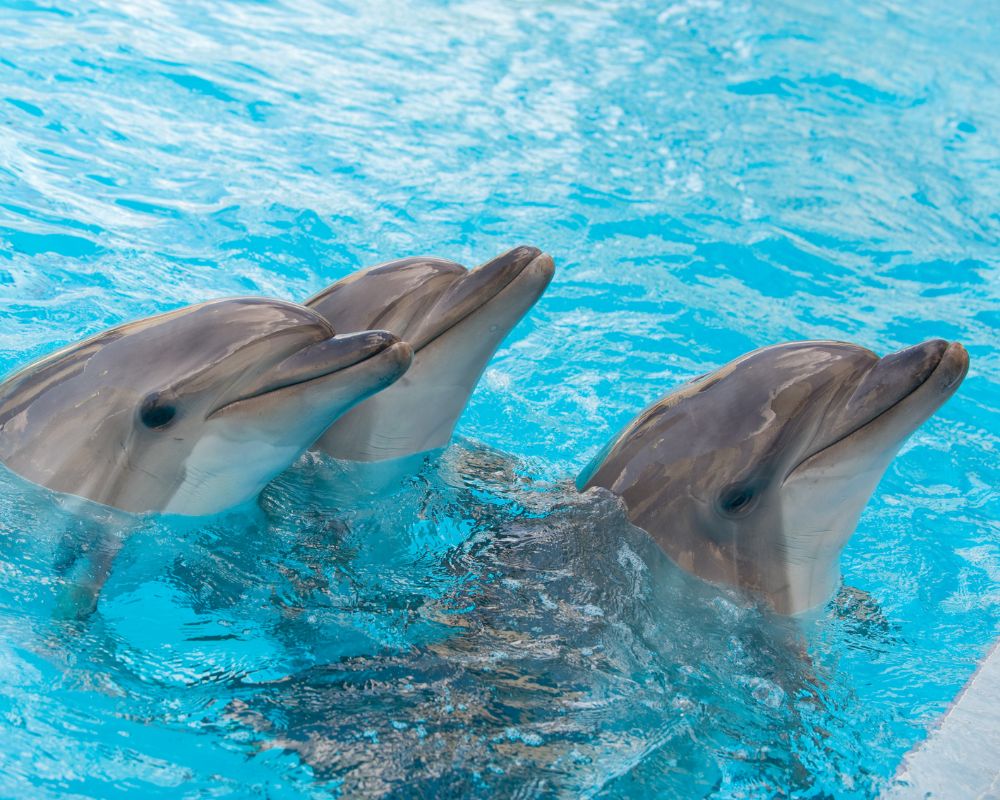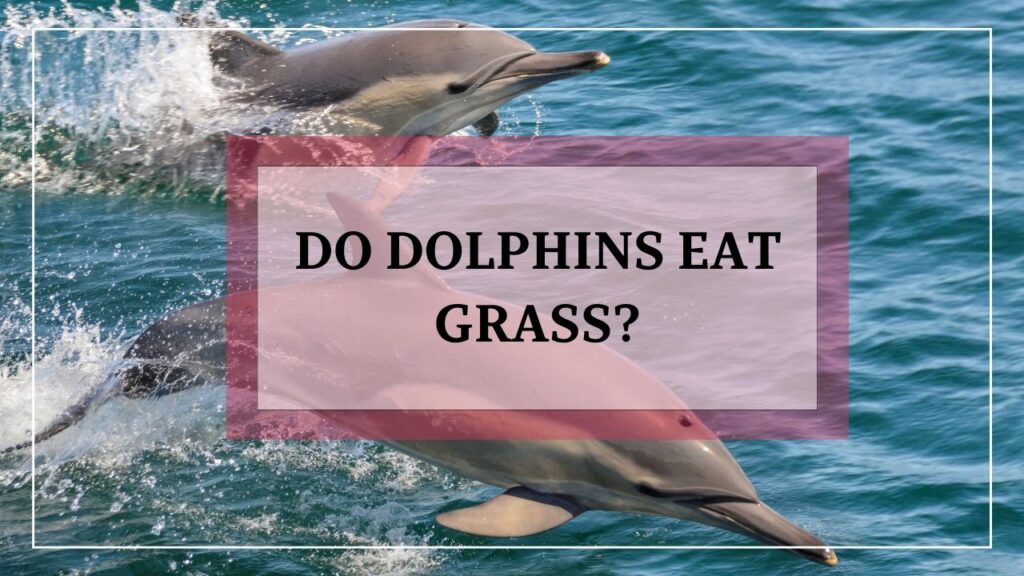Have you ever wondered if dolphins eat grass? It’s an interesting question that may have crossed your mind if you’ve ever observed these magnificent creatures in the wild.
Dolphins are fascinating animals that belong to the family Delphinidae. They are known for their playful behavior, high intelligence, and social nature.
But when it comes to their diet, what do they really eat? Are they herbivores like cows and goats, or do they consume only fish and squid?
In this post, we’ll explore the topic of whether or not dolphins eat grass and provide you with some interesting insights into their eating habits.
Do Dolphins Eat Grass?

Dolphins are known for their love of fish, squid, and other marine animals, but do they ever indulge in a little grass? The answer is a resounding no, and here’s why.
Contrary to popular belief, dolphins do not eat grass. The idea that they do likely stems from a misunderstanding of their behavior.
For example, sometimes dolphins will playfully toss seaweed around or even ingest it briefly before spitting it back out. But this behavior is not the same as eating grass.
The main reason why dolphins cannot digest grass is due to their digestive system. Dolphins have a simple stomach and a short intestine, which makes it difficult for them to break down and extract nutrients from plant material. Unlike herbivorous animals such as cows or sheep, which have four-chambered stomachs and complex digestive systems, dolphins are adapted to a diet of meat and seafood.
But why is it so important that dolphins stick to their natural diet? Well, for starters, their digestive system is not equipped to handle plant material, and ingesting it can lead to some pretty negative effects.
If a dolphin were to eat grass, it could cause a blockage in its digestive tract, leading to constipation, abdominal pain, and other digestive issues.
Furthermore, grass contains cellulose, a complex carbohydrate that is difficult for dolphins to break down. This can result in bloating and discomfort, as well as a decrease in energy levels.
Why Don’t Dolphins Eat Grass?
So, we now know that dolphins do not eat grass. But why exactly is this the case? Let’s explore some of the reasons why dolphins stick to a diet of fish and other marine animals.
Evolutionary Adaptations Of Dolphins
Dolphins are highly specialized animals that have evolved to live and thrive in their marine environment. Over time, they have developed a streamlined body shape, a powerful tail for swimming, and a sophisticated echolocation system for locating prey. These adaptations have allowed dolphins to become efficient hunters of fish and squid, which make up the majority of their diet.
Role Of Teeth In Dolphin’s Diet
Another reason why dolphins do not eat grass is due to their teeth. Dolphins have sharp, pointed teeth that are perfectly adapted for catching and tearing apart fish and squid. However, these teeth are not designed for grinding or chewing plant material like grass. In fact, if a dolphin were to try and eat grass, it could damage its teeth and make it difficult for them to catch its preferred prey.
Availability Of Other Food Sources
In addition to their specialized teeth and hunting adaptations, dolphins have access to a wide variety of food sources in the ocean. From fish and squid to shrimp and crustaceans, there is no shortage of prey items for dolphins to choose from. This abundance of food options makes it unnecessary for dolphins to eat grass, which would provide little nutritional value and could potentially harm their digestive system.
Limitations Of Their Digestive System
As we discussed earlier, the digestive system of dolphins is not equipped to handle plant material like grass. With a simple stomach and a short intestine, dolphins lack the specialized digestive enzymes and microbial populations that herbivorous animals rely on to extract nutrients from plant material.
Comparison With Herbivorous Animals
Speaking of herbivorous animals, it’s worth noting that dolphins are not the only animals that stick to a meat-based diet. Many carnivorous animals, including lions, tigers, and wolves, have similarly adapted to a diet of meat and animal products. In contrast, herbivorous animals like cows, sheep, and deer have specialized digestive systems and teeth designed specifically for grinding and breaking down plant material.
Can Grass be Harmful to Dolphins?
Now that we know dolphins cannot eat grass, let’s explore whether it can be harmful to them.
A. Toxicity of Certain Plant Species
Just like certain plants can be toxic to humans and other animals, some types of grass can be harmful to dolphins. These plants contain toxins that can cause a range of health issues such as gastrointestinal problems, liver damage, and even death.
B. Impact of Grass on a Dolphin’s Digestive System
As mentioned earlier, dolphins are not equipped to digest plant material. When they accidentally consume grass or other plants, it can lead to blockages in their digestive system. This can cause severe discomfort, pain, and even death if left untreated.
Studies On The Effects Of Plant Material On Dolphins
Several studies have been conducted to examine the effects of plant material on dolphins.
In one study conducted by the University of Zurich, researchers found that dolphins in captivity who were fed a diet of mainly fish and squid suffered from intestinal blockages when they were fed hay. While this study was conducted on captive dolphins, it suggests that even small amounts of plant material can have negative effects on dolphins’ digestive systems.
Marine biologists who have observed dolphins in the wild have also noted cases of dolphins consuming plants. However, they have observed that these cases are rare and often involve the dolphins accidentally ingesting seaweed or other plant material while hunting for fish.
While dolphins can’t digest grass and other plants, consuming them can be harmful, particularly if the plants are toxic. Even non-toxic plants can cause blockages in their digestive system, leading to serious health issues.
Therefore, it’s important for us to understand the limitations of dolphins’ digestive systems and ensure they are not exposed to harmful plant material.
Why Does the Myth Persist?
You may be wondering how this myth came about in the first place. It’s actually a pretty common misconception, and there are a few reasons why it still persists.
One reason could be the fact that dolphins are often seen in areas where there is seagrass, which they do swim through and interact with. Some people may have mistaken this as the dolphins consuming the grass when in reality, they are simply swimming through it.
Another possible source of misinformation is the fact that dolphins are known to play with seaweed and kelp, which they may toss around with their noses or even in their mouths. This playful behavior can be mistaken for feeding behavior, leading some to believe that dolphins eat grass.
The Importance Of Fact-Checking
Whatever the source of misinformation, it’s important to fact-check before accepting any myths or misconceptions about animals. In today’s age of information overload, it can be easy to come across false information and believe it without verifying its accuracy.
Conclusion
In conclusion, the idea that dolphins eat grass is simply a myth. While they may occasionally ingest some plant material, it is not a significant part of their diet. Their teeth, digestive system, and evolutionary adaptations all point to their preference for a meat-based diet.
However, it is important to note that the consumption of certain plant species can be harmful to dolphins. As with any animal, it is crucial to understand their dietary needs and the potential risks of consuming certain foods.

